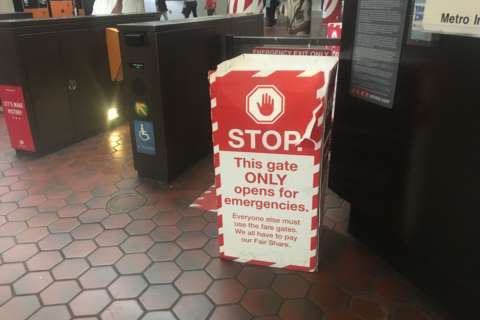WASHINGTON — Metro Transit Police risk guns and ammunition falling into the wrong hands without some key changes, a heavily redacted audit released Thursday by Metro’s Office of Inspector General found.
“Good news is all [140] of the firearms in our sample were accounted for, but there are improvements needed: security of firearms and ammunition, segregation of duties, [and] inventory controls over ammunition,” Inspector General Geoff Cherrington told Metro Board members.
Even the first finding is redacted in the report made available publicly. The significant redactions include the details of several recommended changes, the number and type of guns owned by the Metro Transit Police Department, and specific amount of ammunition stored at Metro’s armory.
“In this instance, we felt protecting law enforcement operations and national security was more important than releasing the full contents of the report,” Cherrington said.
Metro Transit Police requested the redactions, which include all photos in the report.
The report describes Metro as maintaining “an extensive supply of ammunition.”
“While the dollar value of a firearm may not be large, a WMATA-owned firearm used in a homicide or other criminal activity would be tragic,” Cherrington told the Metro Board’s Audit Committee Thursday.
The report, dated Aug. 3, adds that a Metro-owned gun used in a crime “could be a public relations debacle.”
Among the 140 firearms accounted for in the random sample, 56 officers had their assigned guns in their possession, 40 were properly in the department’s armory, 41 were documented as disposed of to a private firm in 2012, one was properly reported missing, one was properly reported lost, and one was properly reported stolen.
Recommendations
While Metro has added some security functions, the report finds more are needed to secure guns and ammunition.
“This occurred because WMATA did not conduct a risk assessment, or implement all available security function,” the report said between redacted sentences.
Even the section explaining the importance of the first finding is blacked out, but the recommendations to address issues that could pose a “high” risk are to conduct a risk assessment and implement changes based on any identified risks and general best practices.
In response, the Metro Transit Police Department said the facility had not yet been opened during the last threat assessment, so it will be included in a review that is scheduled in January. Based on the review, the department will decide whether any additional security procedures are needed.
A second finding is that the two “armorers” in charge of Metro’s firearms and ammunition share too many responsibilities, resulting in a lack of checks and balances to ensure guns or ammunition do not disappear.
Federal oversight principles recommend separating the jobs of purchasing from processing and receiving or, if that is not practical, adding extra supervision.
“The audit did not reveal any fraudulent activities; however, the risk of fraud and/or abuse is greatly enhanced under this structure,” the report found.
The police department is trying to hire a civilian armorer to replace one of the sworn officers filling the role now, but neither of the current armorers had formal training or policies on inventory control. Police also conduct their own annual firearms audits.
“Due to the size of the facility, staffing limitations allocated to the Training Division, along with the requisite knowledge required to identify different weapons, ammunition and components, and the steps the MTPD has taken … to mitigate this risk, the department accepts the risk that the lack of segregation of duties pose,” Chief Ron Pavlik’s response to the report said.
The third finding, regarding ammunition controls, includes concerns that officers could not be sure how old some ammunition was since many shipments had no dates on them.
Other records showed the rounds were up to 4 years old.
Recommendations tied to inventory controls include new policies and procedures and improved training.
Much of the response to that recommendation is redacted, but a summary of the response said Metro has made some changes but accepts some risks due to limited resources.
The Office of Inspector General finds that the planned fixes “should resolve the issues.”







